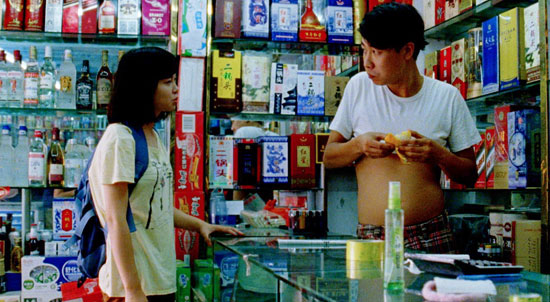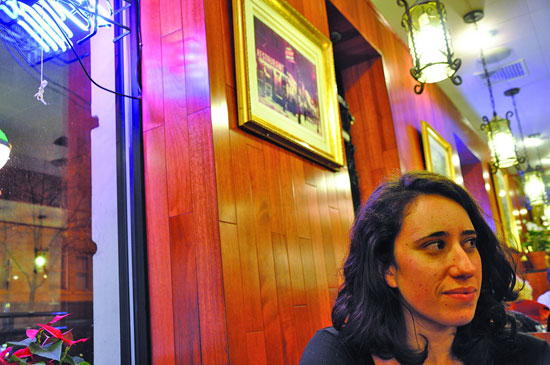 |
|
A scene from the independent film Iceberg. Below: American filmmaker Maya E. Rudolph.
|

New York filmmaker Maya E. Rudolph believes Beijing's rock scene is unique. Caroline Berg in New York finds out why she was inspired to make a movie about it.
In 2006, New York native Maya E. Rudolph went to Beijing and found Chinese rock 'n' roll. In 2012, she returned to make a film about it.
Now, Rudolph's short, Iceberg, is in post-production. The 25-year-old aims to get her project on the independent film festival circuit and, from there, gain enough financial support to finally produce a full-length version of her story.
"This is a world that is very important to me," says Rudolph, a writer and filmmaker. "To me, (Chinese rock 'n' roll) represents this kind of spirit that is very rare to come across in New York."
In support of her cause, Rudolph last fall submitted her project to Kickstarter, an increasingly popular platform that allows producers of creative projects to tap the online crowd for funding. According to Kickstarter's website, 44 percent of projects have reached their funding goals, since the platform was launched in April 2009.
"I think Kickstarter is one of the most important things that has happened for emerging artists and innovators of any kind in a really long time," Rudoph says.
By contrast, she says, artists in China are trying to fund projects through collectives. Younger filmmakers join together and are willing to take on a variety of production roles to make up for the "shaky" infrastructure of independent film in China.
"People are trying to figure out how to do things super cheap and with a lot of integrity in an environment where those things are not at all valued," Rudolph says. "I think there are really vital lessons to be taken from both communities and the more good ideas the better. It doesn't matter where they're coming from."
Through her work in New York with dGenerate Films, an organization devoted to distributing contemporary independent films from the Chinese mainland, Rudolph often comes into contact with pioneering Chinese directors.
"There are filmmakers in China who are operating outside the lines and operating literally independently," she says. "They are, of their own initiative, going somewhere with a camera to tell a story that other people aren't paying attention to."
What disheartens Rudolph most are the weak distribution platforms for these films, whether in China or the US.
"You get used to doing a Q&A for these screening events where there are, like, 10 people," Rudolph says. "It's incredibly discouraging because these are really vital stories, and these are really talented filmmakers."
Nevertheless, Rudolph forges on with her own directorial debut.
After writing a script that she hoped would capture the spirit of the Beijing rock scene that has so transfixed her, Rudolph presented it to her friends at the Beijing-based production company So Uncool Entertainment. They gave her the green light.
Encouraged, Rudolph applied for grants and secured enough support from the Four Oaks Foundation to finance a short version of the planned feature film, Iceberg. That event, she says, marked "when it started to become real".
"I'd known for a while that I was interested in creating some sort of film project that had emphasis on this (Beijing) music scene, but I was and am extremely wary," the director says. "The challenge of doing something that's not like, 'Guess what, world, they have guitars in China!' is very important to me."
According to Rudolph, Iceberg is a universal story, but set in a specific time and place.
"In all the conversations I had among the actors, musicians and crewmembers, we all wanted this film to be a representation of a world that we know," she says. "This world is important to us, where people listen to this particular kind of music, drink this kind of beer and think about these certain kinds of thoughts."
Of course, Rudolph acknowledged, people from all over the world hang out and go to rock shows, but there's something about the flavor of Beijing's rock music scene that you can't find anywhere else.
The community is so small that one can see "how the people in it are evolving", Rudolph says.
Rudolph cites the "no wave" music movement from the late 1970s as an example of the Beijing rock music community's offbeat character.
No wave, as the New York Times put it, was "a cacophonous, confrontational subgenre of punk rock" that was "perhaps the strangest and shortest-lived" period of music in the history of experimental music in New York.
Now, the Beijing rock scene has not only resurrected this obscure genre, but embraced it.
After one Chinese bandleader discovered, and subsequently became hooked on, the no wave band, DNA, he made DNA T-shirts and sold them at a popular punk music venue in Beijing.
"These T-shirts are now a significant piece of social currency," Rudolph says with a laugh. "It's something that's become a symbol of taste in this particular (rock) scene."
In tribute to this trend, Rudolph included a reference to DNA in her film.
"Something I think is important to the film both in the way it was made and what it represents is that none of the community would be possible if people didn't support their friends," Rudolph says.
The young director said she felt a particular freedom while working in China to pursue her passions and interests - and even to make mistakes.
"I'm really fortunate that I found people that I could connect with and found the cultivation of stories that are compelling," she says. "Being around people who are genuinely excited about what they're doing, in terms of both music and filmmaking, is unbelievably exciting."
Ultimately, Rudolph hopes this enthusiasm translates to her film.
On Kickstarter, she writes, "(Iceberg) feels like a night at a Beijing rock club: energetic, passionate, a little bit surreal and full of potential."
Source: China Daily
Editor: Yang Qi
